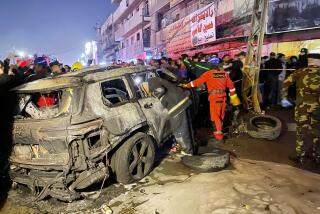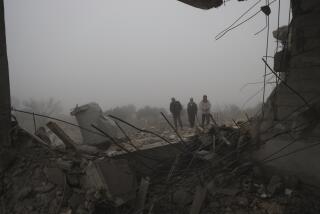Bombings hit Baghdad on Iraqi holiday
Moments after jubilant Iraqi troops were captured on videotape Sunday shouting “Where is terrorism now?” a suicide bomber detonated his explosives vest here, killing at least three soldiers celebrating Army Day.
It was the first of three deadly attacks in Baghdad, all within about an hour. The bombings killed at least eight people and injured dozens, though some estimates put the death toll as high as 15.
Despite an overall decline in violence in recent months, several high-profile bombings have recently rocked the city. On Dec. 28, a suicide bomber struck Tayaran Square, a popular outdoor marketplace, killing 10 people. And on New Year’s Day, a bomber infiltrated a funeral, killing at least 34 people.
Like the funeral attack, Sunday’s blasts struck on a national holiday. Iraqi soldiers celebrated in cities across the country, waving flags and guns and marching in parades commemorating the army’s formation in 1921.
Sunday’s most serious bombing occurred about 12:30 p.m. in the central Baghdad neighborhood of Karada as Iraqi military, government and tribal leaders gathered for Army Day ceremonies.
The suicide bomber set off his explosives vest when three soldiers tried to stop him from entering the offices of the Organization of Iraqi Unity, police and U.S. military officials said.
Television crews on hand to cover the event captured the chaotic scene with shaky cameras: Civilians ducked for cover, and soldiers dragged the bodies of their dead or injured comrades. One policeman at the scene said the head of the suicide bomber had been blown off and rolled away from the blast site.
Iraqi officials said four soldiers died in the attack. The U.S. military said at least three Iraqi soldiers and two civilians were killed. Other estimates put the death toll as high as 11, with 17 injured. The discrepancies between the reports could not be immediately resolved.
Abu Anmar, 35, said he was welcoming people to the event when he heard fighting and screaming.
“I ran outside, to be astonished by a big ball of fire and a large explosion just outside the building,” Abu Anmar, a secular Kurd, said from a local hospital, where he was being treated for a shoulder injury and facial burns.
“The next thing I knew, fire was all over the place. I saw policemen and army men lying dead on the ground and burning bodies that were turning black.”
Twenty minutes later, a second bomb exploded in front of a popular restaurant in the Qahira neighborhood of north Baghdad, killing three civilians and injuring 15 others.
A short time later, a series of car bombs struck car lots in central Baghdad. At least one person died and four others were injured as three bombs exploded, one after another, every five to seven minutes, witnesses said. Police discovered and detonated a fourth bomb.
Car lot owner Ali Hussein, 43, said he and other businessmen had been receiving written threats from insurgents in the last two months accusing them of cooperating with Americans.
Despite the attack at the Army Day gathering, celebrations around the country continued mostly as planned. Only one, inside Baghdad’s heavily fortified Green Zone, was canceled due to security concerns, said Defense Ministry spokesman Mohammed Askari.
Also Sunday, gunmen in two cars shot one of the leaders of a volunteer group helping to provide security in the Shaab neighborhood of north Baghdad. Police said the killing occurred as Ismail Abbas was driving away from his home about 7:30 a.m.
In the northern city of Mosul, four bombs exploded in quick succession, all targeting churches. No one was reported killed, though four people were injured.
The U.S. military reported that a soldier was killed Sunday when a bomb detonated near his vehicle during combat operations in south Baghdad. The soldier’s name was not released. At least 3,910 U.S. troops have been killed since the March 2003 invasion, according to the independent website icasualties.org.
--
Times staff writers Usama Redha and Caesar Ahmed and special correspondents in Baghdad contributed to this report.
More to Read
Start your day right
Sign up for Essential California for news, features and recommendations from the L.A. Times and beyond in your inbox six days a week.
You may occasionally receive promotional content from the Los Angeles Times.






